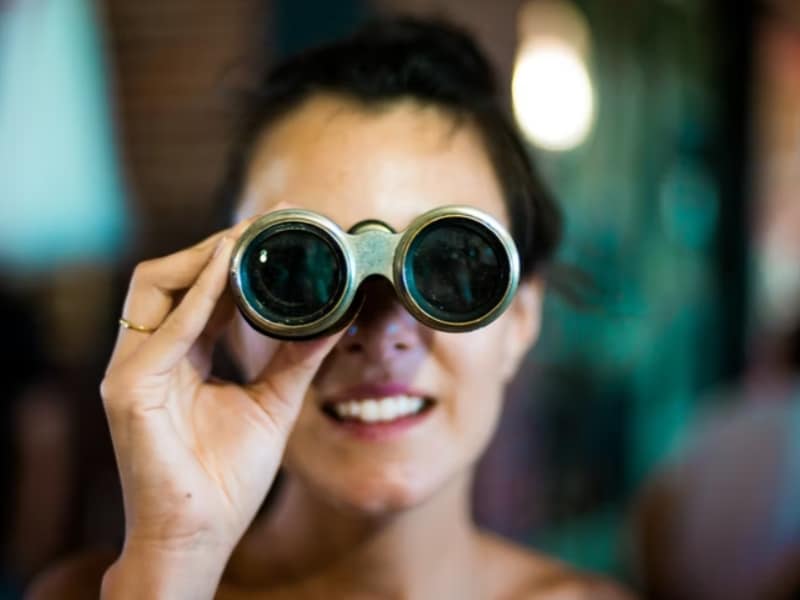Curiosity may have killed the cat, but curiosity makes me feel alive. When I get curious about the world, my eyes open to all the magic that surrounds me.
Fostering a sense of curiosity can bring you joy when life starts to feel mundane. And you can fight off depression and anxiety by developing a healthy curiosity about your own thoughts.
If you feel like you’ve lost your sense of curiosity, this article is here to help you find it again. You may be just a few questions away from a happier life.
Why do we stop being curious?
As children, it seems we are inherently motivated to relentlessly learn about the world around us. But somewhere along the way, that curiosity seems to get lost.
Research indicates that as children we ask 107 questions per hour. I think I’m lucky if I ask one question an hour. And more times than not that question is, “How are you?”
So why do we stop asking questions? What is it about adulthood that causes us to lose our sense of curiosity?
A study in 2008 found that as we increase our knowledge base, our curiosity seems to dissipate. Adults tend to feel that they “know most things” and lose that keen interest as their understanding broadens. Some people go further and assume they know everything, while in fact, they don’t even come close. This is explained by the Dunning-Kruger effect, which we’ve explained here.
And honestly, it takes less effort to just accept the world at face value. Being curious takes active energy.
But I’ve found that when I do feed my curiosity, the joy I feel is well worth the effort.
The benefits of being curious
Don’t just take my word that curiosity is worth your time. The research indicates that people who take the time to be curious report greater levels of happiness.
Beyond just being happier, research shows that curious people are more productive at work and achieve greater levels of success.
Two things I personally want out of life are happiness and to achieve my goals. It seems that curiosity may be the key ingredient to what I want. It may be the things that leads to a meaningful life for me.
In addition, we naturally know that we don’t enjoy being bored. Any time I experience boredom, I gravitate toward negative emotions.
Curiosity can pull you out of a state of boredom and introduce excitement back into the picture. I try to remember this anytime I feel I am in a rut in life.
6 ways to be more curious
Being more curious doesn’t have to feel like rocket science. These 6 tips will help you develop a healthy addiction to questioning the world around you.
1. Question yourself
Sometimes our curiosity needs to start with ourselves. We’re so quick to just accept the way we think without questioning it.
I had to learn through coaching that I need to question my own thoughts more. As someone who is anxious, my first thought is often not the most accurate one.
Just this past weekend, I was hiking in a lightning storm. My first thought was, “I’m about to get struck by lightning and die.”
Just writing it out makes me realize how absurd it sounds. But instead of spiraling out, I’ve learned to get curious and ask myself questions.
In moments like those, I tend to ask myself, “What are the odds of that?”
By just asking myself questions, I can gain clarity that helps me view the world and my situation with a reasonable perspective.
It’s important to be curious about the world around you, but it may be more important to get curious about yourself.
2. Ask more questions in conversation
When you’re chatting it up with someone, how often do you ask them questions? If you’re like me, you tend to stop after a few questions.
There is so much to know about a person. Yet most of us stop with surface-level questions assuming we know someone.
I try to challenge myself to get curious about even the most ordinary things in someone’s life. You’d be surprised by how asking more questions allows you to dive deeper with the people around you, even those close to you.
With my husband, I make it a point to ask him at least 3 questions a day. Sometimes they are general questions about his personality. Other times, the questions are looking deeper into an experience he had that day.
If you struggle to think of questions, it could be worth buying a question card game. This way you have a set of preset questions that helps get you started.
3. Give yourself a 180
A great way to pique your curiosity is to mix it up. If you do the exact same things day in and day out, it’s easy to become bored with life.
I’m not saying you have to go wild and completely change your life. But start becoming more curious about little ways to change your daily routine.
I do this in a few different ways. I make it a point to mix up the route I drive to work slightly to expose myself to new surroundings. This has caused me to run into farmer’s markets or discover there was a cute coffee shop nearby.
Another way I do this is by mixing up my weeknight routine. It’s easy to just come home and plop in front of the TV. What I try to do instead is look into community events during the week or have a good book waiting for me.
Having these slight changes to my routine helps me stay curious and engaged with the world around me.
4. Stop your assumptions
Sometimes we lose curiosity because we make assumptions. And you know what they say about assumptions. Well, I’ll let you finish that one.
I’ve noticed as a healthcare provider I start making assumptions about a patient’s symptoms from the moment they walk in. It’s just how my brain works.
But these assumptions can stand in the way of me asking more questions. And they can cause me to potentially misdiagnose the person altogether.
It’s not just patient care where I make assumptions though. I assume I know everything I need to know about those I love or about topics I consider myself an expert in.
When you stop your assumptions in their tracks, you open the door for curiosity.
There is only one assumption I am trying to adopt. And that’s the assumption that there will always be more to learn.
5. Make an effort to learn daily
There is at least one moment each day where I say, “I don’t know.” And if you don’t find yourself in the same boat, I applaud your brilliance. In reality, you might be lacking a little bit of self-awareness, as no-one knows everything.
I’ve started to take note of when I say “I don’t know”. Wrapped up in those three little words is an opportunity to learn and grow.
Instead of moving on with your life, take the time to look things up. Foster curiosity for what you don’t know.
By using my good friend Google, I’ve learned a slew of historical facts and the population of my hometown. With modern technology, there is no excuse to not take learning into your own hands.
You’d be surprised by how much you can learn in a day by taking the time to look up the answers to your “I don’t know” replies.
And it also may just help you become a trivia rockstar at your local brewery.
6. Read and read some more
There may be no better way to spark curiosity than to open up a book.
There are books about every subject known to man. If you want to learn it, I guarantee there is a book out there about it.
I gravitate towards non-fiction books because it’s like someone is passing on a lifetime’s worth of information in a condensed form.
If you’ve always wondered about a subject or want to open your mind to a fictitious world, read a book.
I’ve never met someone who regretted spending time lost in a book.
Wrapping up
Life doesn’t have to be a monotonous drag. You can use the tips from this article to start asking questions to fuel your curiosity about everything. You may just find that there’s a life of excitement waiting for you when you step into the world of the unknown.

